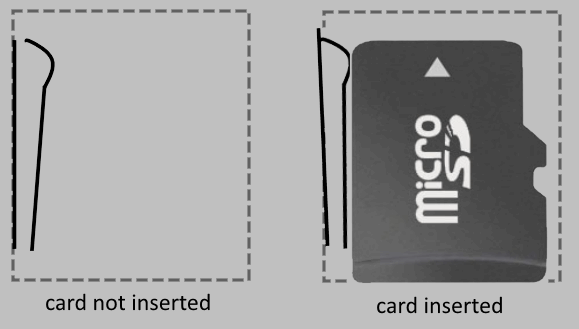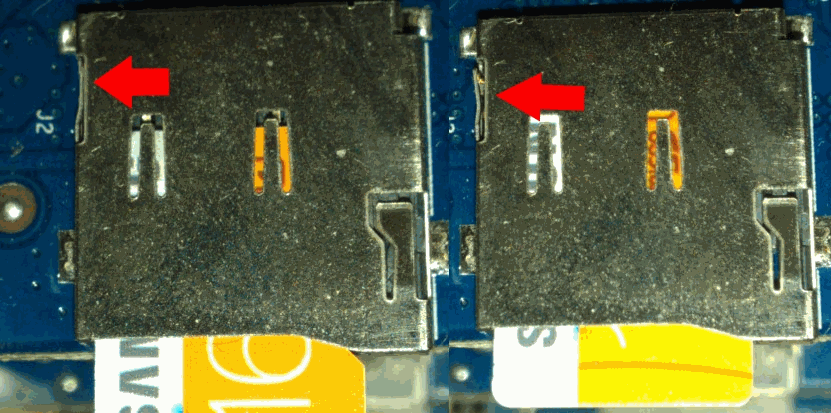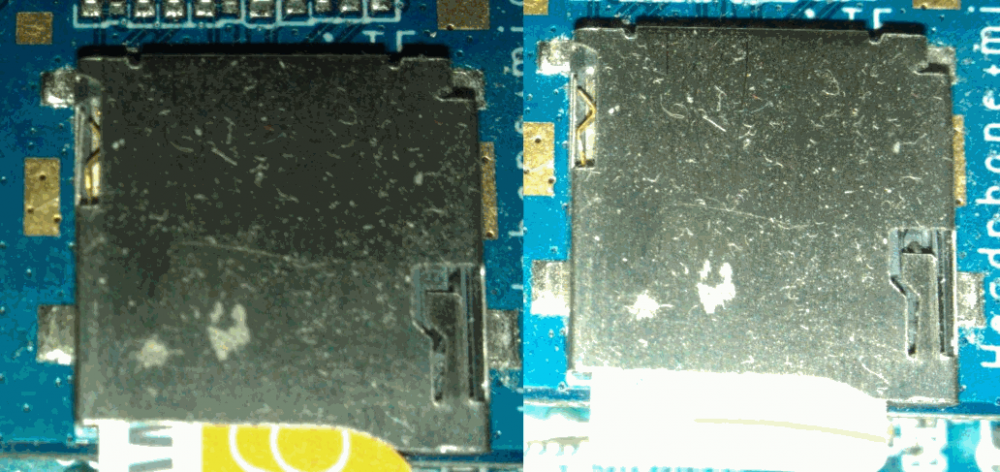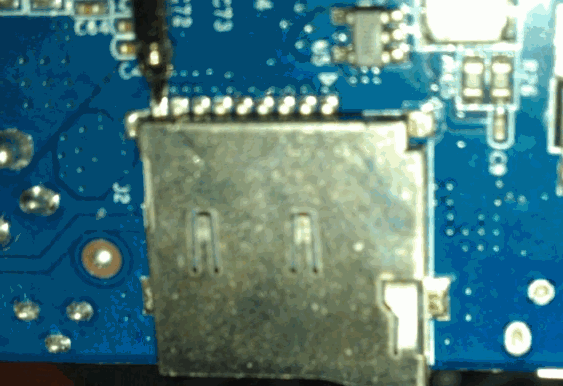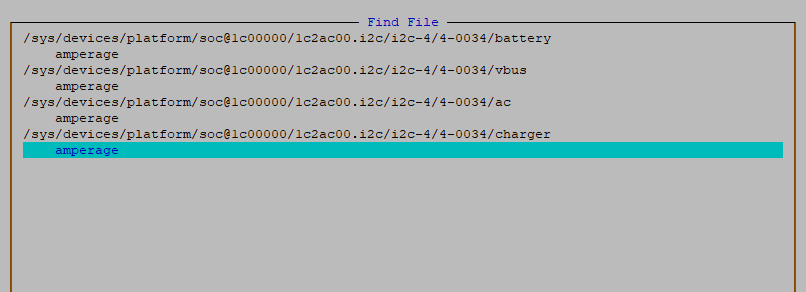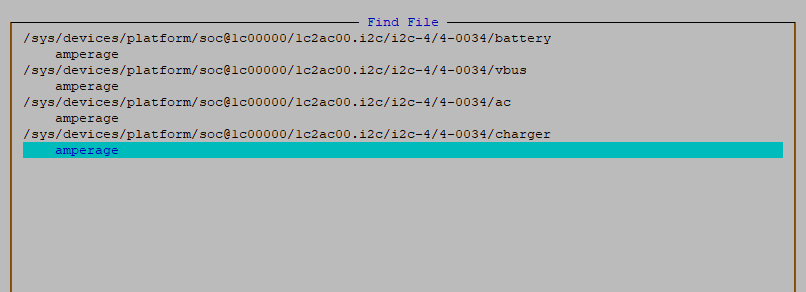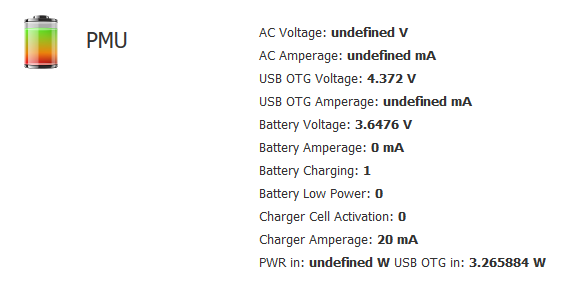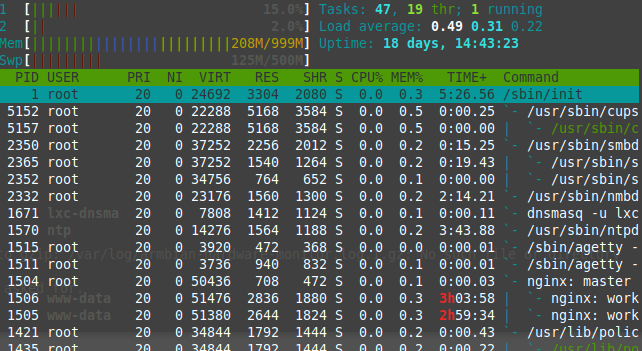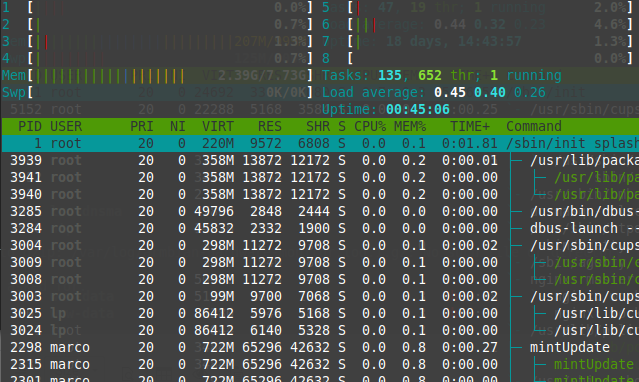Search the Community
Showing results for tags 'bananapi'.
-

MMC: No card present error on Allwinner boards
zador.blood.stained posted a topic in Allwinner sunxi
Symptoms: Board does not boot Armbian from inserted SD card, but may boot other distributions (based on old/legacy u-boot). Following or similar output can be grabbed from the serial console: U-Boot SPL 2017.01-armbian (Feb 02 2017 - 03:04:04) DRAM: 2048 MiB Trying to boot from MMC1MMC: no card present spl: mmc init failed with error: -123 SPL: failed to boot from all boot devices ### ERROR ### Please RESET the board ### The key message here is "MMC: no card present" Most likely cause: Malfunctioning microSD slot card detect switch. It can be verified either visually (with a magnifying glass) or electronically (with a multimeter) - at least in the slots used on Orange Pi boards and on Pine64 the pin near the switch should be shorted to the ground (i.e. SD slot casing) when card is inserted. Illustration (example) of a working switch: Verification (with a multimeter): Probe 1 - slot pin near the switch (may be different for different slot types, but at least true for Oranges and Pine64) Probe 2 - microSD slot casing or other parts connected to GND (not shown on the photo) No card - circuit is open Card inserted - circuit is shorted Photos - card is not inseted on the left and is fully inserted on the right: Orange Pi Pine64 (switch is more visible) Can it be fixed? Yes if the switch is not broken completely, by carefully adjusting (bending) the stationary contact (left on the pictures and photos, it usually is a part of the SD slot casing) i.e using a needle so it touches the moving contact (mostly hidden inside the slot on the photos) when card is inserted and not touching it when it is not inserted.- 16 replies
-
5
-
- Banana Pi
- Banana Pi BPi-M2+
-
(and 2 more)
Tagged with:
-
Hello Community, I'm trying to get Armbian running on my Banana PI M1 with the following image: https://dl.armbian.com/bananapi/archive/Armbian_20.05.2_Bananapi_buster_current_5.4.43_minimal.img.xz I flashed the image with Etcher on my SD Card which is a Sandisk Ultra 16GB SDHC Card. After flashing I have inserted the Card into my Banana PI but I only get a red light, I already tried different images like the bionic image but without positive result and tried different power supply cables. In my DHCP Server I see no request. I have also flashed for testing reasons current image of Bananian which was directly working but I don't want to use that because their project is not under active development anymore and they recommend to use Armbian. I would appreciate any ideas.
-
Is it possible to include an older kernel in my build? Something along the 3.x era? I really need to get an OV5640 working, and it would seem that 5.x kernels don't work with it. The thread is for an orange Pi, but I have a banana pi. Either way, it's an allwinner A20 and I've struck out getting the camera to be detected.
-
1-Wire works, I put the explanation at the end of this post. Hello There, yesterday I burned a fresh image of Armbian_20.02.5_Bananapi_buster_current_5.4.26 to replace my current setup (Armbian_5.91_Bananapi_Debian_buster_next_4.19.59) and I run into some trouble with 1-Wire. I tried everything I knew and found on the web but 1-Wire still won't work. So I need some help. My hardware setup was not changed and it worked for at least two years. So would rule out a wiring problem at the moment. My SoC is a Banana PI M1 ( http://www.banana-pi.org/m1.html ) The strange thing is, that 1-Wire wont come up by itself, I have to run modproble after reboot to get at lease the the folders at /sys/bus/w1/* but it show no devices. And the pin (PH2) seems not to be claimed by 1-Wire anyway. root@bananapi:~# uname --all Linux bananapi 5.4.35-sunxi #trunk SMP Thu Apr 23 18:06:21 CEST 2020 armv7l GNU/Linux root@bananapi:~# ls /sys/bus/w1/devices/ ls: cannot access '/sys/bus/w1/devices/': No such file or directory root@bananapi:~# ls /sys/bus/w1 ls: cannot access '/sys/bus/w1': No such file or directory root@bananapi:~# modprobe w1_gpio && modprobe w1_therm && modprobe wire root@bananapi:~# ls /sys/bus/w1 devices drivers drivers_autoprobe drivers_probe uevent root@bananapi:~# ls /sys/bus/w1/devices/ root@bananapi:~# root@bananapi:~# dmesg | grep 1-wire [ 127.418901] Driver for 1-wire Dallas network protocol. root@bananapi:~# cat /boot/armbianEnv.txt verbosity=1 logo=disabled console=both disp_mode=1920x1080p60 overlay_prefix=sun7i-a20 rootdev=UUID=0b455209-63d8-4829-aa17-9ac119488a93 rootfstype=ext4 overlays=w1-gpio can param_w1_pin=PH2 param_w1_pin_int_pullup=0 usbstoragequirks=0x2537:0x1066:u,0x2537:0x1068:u root@bananapi:~# cat /sys/kernel/debug/pinctrl/1c20800.pinctrl/pinmux-pins Pinmux settings per pin Format: pin (name): mux_owner gpio_owner hog? pin 0 (PA0): 1c50000.ethernet (GPIO UNCLAIMED) function gmac group PA0 pin 1 (PA1): 1c50000.ethernet (GPIO UNCLAIMED) function gmac group PA1 pin 2 (PA2): 1c50000.ethernet (GPIO UNCLAIMED) function gmac group PA2 pin 3 (PA3): 1c50000.ethernet (GPIO UNCLAIMED) function gmac group PA3 pin 4 (PA4): 1c50000.ethernet (GPIO UNCLAIMED) function gmac group PA4 pin 5 (PA5): 1c50000.ethernet (GPIO UNCLAIMED) function gmac group PA5 pin 6 (PA6): 1c50000.ethernet (GPIO UNCLAIMED) function gmac group PA6 pin 7 (PA7): 1c50000.ethernet (GPIO UNCLAIMED) function gmac group PA7 pin 8 (PA8): 1c50000.ethernet (GPIO UNCLAIMED) function gmac group PA8 pin 9 (PA9): (MUX UNCLAIMED) (GPIO UNCLAIMED) pin 10 (PA10): 1c50000.ethernet (GPIO UNCLAIMED) function gmac group PA10 pin 11 (PA11): 1c50000.ethernet (GPIO UNCLAIMED) function gmac group PA11 pin 12 (PA12): 1c50000.ethernet (GPIO UNCLAIMED) function gmac group PA12 pin 13 (PA13): 1c50000.ethernet (GPIO UNCLAIMED) function gmac group PA13 pin 14 (PA14): (MUX UNCLAIMED) (GPIO UNCLAIMED) pin 15 (PA15): 1c50000.ethernet (GPIO UNCLAIMED) function gmac group PA15 pin 16 (PA16): 1c50000.ethernet (GPIO UNCLAIMED) function gmac group PA16 pin 17 (PA17): (MUX UNCLAIMED) (GPIO UNCLAIMED) pin 32 (PB0): 1c2ac00.i2c (GPIO UNCLAIMED) function i2c0 group PB0 pin 33 (PB1): 1c2ac00.i2c (GPIO UNCLAIMED) function i2c0 group PB1 pin 34 (PB2): (MUX UNCLAIMED) (GPIO UNCLAIMED) pin 35 (PB3): (MUX UNCLAIMED) (GPIO UNCLAIMED) pin 36 (PB4): 1c21800.ir (GPIO UNCLAIMED) function ir0 group PB4 pin 37 (PB5): (MUX UNCLAIMED) (GPIO UNCLAIMED) pin 38 (PB6): (MUX UNCLAIMED) (GPIO UNCLAIMED) pin 39 (PB7): (MUX UNCLAIMED) (GPIO UNCLAIMED) pin 40 (PB8): (MUX UNCLAIMED) (GPIO UNCLAIMED) pin 41 (PB9): (MUX UNCLAIMED) 1c20800.pinctrl:41 pin 42 (PB10): (MUX UNCLAIMED) (GPIO UNCLAIMED) pin 43 (PB11): (MUX UNCLAIMED) (GPIO UNCLAIMED) pin 44 (PB12): (MUX UNCLAIMED) (GPIO UNCLAIMED) pin 45 (PB13): (MUX UNCLAIMED) (GPIO UNCLAIMED) pin 46 (PB14): (MUX UNCLAIMED) (GPIO UNCLAIMED) pin 47 (PB15): (MUX UNCLAIMED) (GPIO UNCLAIMED) pin 48 (PB16): (MUX UNCLAIMED) (GPIO UNCLAIMED) pin 49 (PB17): (MUX UNCLAIMED) (GPIO UNCLAIMED) pin 50 (PB18): (MUX UNCLAIMED) (GPIO UNCLAIMED) pin 51 (PB19): (MUX UNCLAIMED) (GPIO UNCLAIMED) pin 52 (PB20): 1c2b400.i2c (GPIO UNCLAIMED) function i2c2 group PB20 pin 53 (PB21): 1c2b400.i2c (GPIO UNCLAIMED) function i2c2 group PB21 pin 54 (PB22): 1c28000.serial (GPIO UNCLAIMED) function uart0 group PB22 pin 55 (PB23): 1c28000.serial (GPIO UNCLAIMED) function uart0 group PB23 pin 64 (PC0): (MUX UNCLAIMED) (GPIO UNCLAIMED) pin 65 (PC1): (MUX UNCLAIMED) (GPIO UNCLAIMED) pin 66 (PC2): (MUX UNCLAIMED) (GPIO UNCLAIMED) pin 67 (PC3): (MUX UNCLAIMED) (GPIO UNCLAIMED) pin 68 (PC4): (MUX UNCLAIMED) (GPIO UNCLAIMED) pin 69 (PC5): (MUX UNCLAIMED) (GPIO UNCLAIMED) pin 70 (PC6): (MUX UNCLAIMED) (GPIO UNCLAIMED) pin 71 (PC7): (MUX UNCLAIMED) (GPIO UNCLAIMED) pin 72 (PC8): (MUX UNCLAIMED) (GPIO UNCLAIMED) pin 73 (PC9): (MUX UNCLAIMED) (GPIO UNCLAIMED) pin 74 (PC10): (MUX UNCLAIMED) (GPIO UNCLAIMED) pin 75 (PC11): (MUX UNCLAIMED) (GPIO UNCLAIMED) pin 76 (PC12): (MUX UNCLAIMED) (GPIO UNCLAIMED) pin 77 (PC13): (MUX UNCLAIMED) (GPIO UNCLAIMED) pin 78 (PC14): (MUX UNCLAIMED) (GPIO UNCLAIMED) pin 79 (PC15): (MUX UNCLAIMED) (GPIO UNCLAIMED) pin 80 (PC16): (MUX UNCLAIMED) (GPIO UNCLAIMED) pin 81 (PC17): (MUX UNCLAIMED) (GPIO UNCLAIMED) pin 82 (PC18): (MUX UNCLAIMED) (GPIO UNCLAIMED) pin 83 (PC19): (MUX UNCLAIMED) (GPIO UNCLAIMED) pin 84 (PC20): (MUX UNCLAIMED) (GPIO UNCLAIMED) pin 85 (PC21): (MUX UNCLAIMED) (GPIO UNCLAIMED) pin 86 (PC22): (MUX UNCLAIMED) (GPIO UNCLAIMED) pin 87 (PC23): (MUX UNCLAIMED) (GPIO UNCLAIMED) pin 88 (PC24): (MUX UNCLAIMED) (GPIO UNCLAIMED) pin 96 (PD0): (MUX UNCLAIMED) (GPIO UNCLAIMED) pin 97 (PD1): (MUX UNCLAIMED) (GPIO UNCLAIMED) pin 98 (PD2): (MUX UNCLAIMED) (GPIO UNCLAIMED) pin 99 (PD3): (MUX UNCLAIMED) (GPIO UNCLAIMED) pin 100 (PD4): (MUX UNCLAIMED) (GPIO UNCLAIMED) pin 101 (PD5): (MUX UNCLAIMED) (GPIO UNCLAIMED) pin 102 (PD6): (MUX UNCLAIMED) (GPIO UNCLAIMED) pin 103 (PD7): (MUX UNCLAIMED) (GPIO UNCLAIMED) pin 104 (PD8): (MUX UNCLAIMED) (GPIO UNCLAIMED) pin 105 (PD9): (MUX UNCLAIMED) (GPIO UNCLAIMED) pin 106 (PD10): (MUX UNCLAIMED) (GPIO UNCLAIMED) pin 107 (PD11): (MUX UNCLAIMED) (GPIO UNCLAIMED) pin 108 (PD12): (MUX UNCLAIMED) (GPIO UNCLAIMED) pin 109 (PD13): (MUX UNCLAIMED) (GPIO UNCLAIMED) pin 110 (PD14): (MUX UNCLAIMED) (GPIO UNCLAIMED) pin 111 (PD15): (MUX UNCLAIMED) (GPIO UNCLAIMED) pin 112 (PD16): (MUX UNCLAIMED) (GPIO UNCLAIMED) pin 113 (PD17): (MUX UNCLAIMED) (GPIO UNCLAIMED) pin 114 (PD18): (MUX UNCLAIMED) (GPIO UNCLAIMED) pin 115 (PD19): (MUX UNCLAIMED) (GPIO UNCLAIMED) pin 116 (PD20): (MUX UNCLAIMED) (GPIO UNCLAIMED) pin 117 (PD21): (MUX UNCLAIMED) (GPIO UNCLAIMED) pin 118 (PD22): (MUX UNCLAIMED) (GPIO UNCLAIMED) pin 119 (PD23): (MUX UNCLAIMED) (GPIO UNCLAIMED) pin 120 (PD24): (MUX UNCLAIMED) (GPIO UNCLAIMED) pin 121 (PD25): (MUX UNCLAIMED) (GPIO UNCLAIMED) pin 122 (PD26): (MUX UNCLAIMED) (GPIO UNCLAIMED) pin 123 (PD27): (MUX UNCLAIMED) (GPIO UNCLAIMED) pin 128 (PE0): (MUX UNCLAIMED) (GPIO UNCLAIMED) pin 129 (PE1): (MUX UNCLAIMED) (GPIO UNCLAIMED) pin 130 (PE2): (MUX UNCLAIMED) (GPIO UNCLAIMED) pin 131 (PE3): (MUX UNCLAIMED) (GPIO UNCLAIMED) pin 132 (PE4): (MUX UNCLAIMED) (GPIO UNCLAIMED) pin 133 (PE5): (MUX UNCLAIMED) (GPIO UNCLAIMED) pin 134 (PE6): (MUX UNCLAIMED) (GPIO UNCLAIMED) pin 135 (PE7): (MUX UNCLAIMED) (GPIO UNCLAIMED) pin 136 (PE8): (MUX UNCLAIMED) (GPIO UNCLAIMED) pin 137 (PE9): (MUX UNCLAIMED) (GPIO UNCLAIMED) pin 138 (PE10): (MUX UNCLAIMED) (GPIO UNCLAIMED) pin 139 (PE11): (MUX UNCLAIMED) (GPIO UNCLAIMED) pin 160 (PF0): 1c0f000.mmc (GPIO UNCLAIMED) function mmc0 group PF0 pin 161 (PF1): 1c0f000.mmc (GPIO UNCLAIMED) function mmc0 group PF1 pin 162 (PF2): 1c0f000.mmc (GPIO UNCLAIMED) function mmc0 group PF2 pin 163 (PF3): 1c0f000.mmc (GPIO UNCLAIMED) function mmc0 group PF3 pin 164 (PF4): 1c0f000.mmc (GPIO UNCLAIMED) function mmc0 group PF4 pin 165 (PF5): 1c0f000.mmc (GPIO UNCLAIMED) function mmc0 group PF5 pin 192 (PG0): (MUX UNCLAIMED) (GPIO UNCLAIMED) pin 193 (PG1): (MUX UNCLAIMED) (GPIO UNCLAIMED) pin 194 (PG2): (MUX UNCLAIMED) (GPIO UNCLAIMED) pin 195 (PG3): (MUX UNCLAIMED) (GPIO UNCLAIMED) pin 196 (PG4): (MUX UNCLAIMED) (GPIO UNCLAIMED) pin 197 (PG5): (MUX UNCLAIMED) (GPIO UNCLAIMED) pin 198 (PG6): (MUX UNCLAIMED) (GPIO UNCLAIMED) pin 199 (PG7): (MUX UNCLAIMED) (GPIO UNCLAIMED) pin 200 (PG8): (MUX UNCLAIMED) (GPIO UNCLAIMED) pin 201 (PG9): (MUX UNCLAIMED) (GPIO UNCLAIMED) pin 202 (PG10): (MUX UNCLAIMED) (GPIO UNCLAIMED) pin 203 (PG11): (MUX UNCLAIMED) (GPIO UNCLAIMED) pin 224 (PH0): 1c28c00.serial (GPIO UNCLAIMED) function uart3 group PH0 pin 225 (PH1): 1c28c00.serial (GPIO UNCLAIMED) function uart3 group PH1 pin 226 (PH2): (MUX UNCLAIMED) (GPIO UNCLAIMED) pin 227 (PH3): (MUX UNCLAIMED) 1c20800.pinctrl:227 pin 228 (PH4): (MUX UNCLAIMED) 1c20800.pinctrl:228 pin 229 (PH5): (MUX UNCLAIMED) (GPIO UNCLAIMED) pin 230 (PH6): (MUX UNCLAIMED) 1c20800.pinctrl:230 pin 231 (PH7): (MUX UNCLAIMED) (GPIO UNCLAIMED) pin 232 (PH8): (MUX UNCLAIMED) (GPIO UNCLAIMED) pin 233 (PH9): (MUX UNCLAIMED) (GPIO UNCLAIMED) pin 234 (PH10): (MUX UNCLAIMED) 1c20800.pinctrl:234 pin 235 (PH11): (MUX UNCLAIMED) (GPIO UNCLAIMED) pin 236 (PH12): (MUX UNCLAIMED) (GPIO UNCLAIMED) pin 237 (PH13): (MUX UNCLAIMED) (GPIO UNCLAIMED) pin 238 (PH14): (MUX UNCLAIMED) (GPIO UNCLAIMED) pin 239 (PH15): (MUX UNCLAIMED) (GPIO UNCLAIMED) pin 240 (PH16): (MUX UNCLAIMED) (GPIO UNCLAIMED) pin 241 (PH17): (MUX UNCLAIMED) (GPIO UNCLAIMED) pin 242 (PH18): (MUX UNCLAIMED) (GPIO UNCLAIMED) pin 243 (PH19): (MUX UNCLAIMED) (GPIO UNCLAIMED) pin 244 (PH20): (MUX UNCLAIMED) (GPIO UNCLAIMED) pin 245 (PH21): (MUX UNCLAIMED) (GPIO UNCLAIMED) pin 246 (PH22): (MUX UNCLAIMED) (GPIO UNCLAIMED) pin 247 (PH23): (MUX UNCLAIMED) 1c20800.pinctrl:247 pin 248 (PH24): (MUX UNCLAIMED) 1c20800.pinctrl:248 pin 249 (PH25): (MUX UNCLAIMED) (GPIO UNCLAIMED) pin 250 (PH26): (MUX UNCLAIMED) (GPIO UNCLAIMED) pin 251 (PH27): (MUX UNCLAIMED) (GPIO UNCLAIMED) pin 256 (PI0): (MUX UNCLAIMED) (GPIO UNCLAIMED) pin 257 (PI1): (MUX UNCLAIMED) (GPIO UNCLAIMED) pin 258 (PI2): (MUX UNCLAIMED) (GPIO UNCLAIMED) pin 259 (PI3): (MUX UNCLAIMED) (GPIO UNCLAIMED) pin 260 (PI4): (MUX UNCLAIMED) (GPIO UNCLAIMED) pin 261 (PI5): (MUX UNCLAIMED) (GPIO UNCLAIMED) pin 262 (PI6): (MUX UNCLAIMED) (GPIO UNCLAIMED) pin 263 (PI7): (MUX UNCLAIMED) (GPIO UNCLAIMED) pin 264 (PI8): (MUX UNCLAIMED) (GPIO UNCLAIMED) pin 265 (PI9): (MUX UNCLAIMED) (GPIO UNCLAIMED) pin 266 (PI10): 1c05000.spi (GPIO UNCLAIMED) function spi0 group PI10 pin 267 (PI11): 1c05000.spi (GPIO UNCLAIMED) function spi0 group PI11 pin 268 (PI12): 1c05000.spi (GPIO UNCLAIMED) function spi0 group PI12 pin 269 (PI13): 1c05000.spi (GPIO UNCLAIMED) function spi0 group PI13 pin 270 (PI14): 1c05000.spi (GPIO UNCLAIMED) function spi0 group PI14 pin 271 (PI15): (MUX UNCLAIMED) (GPIO UNCLAIMED) pin 272 (PI16): (MUX UNCLAIMED) (GPIO UNCLAIMED) pin 273 (PI17): (MUX UNCLAIMED) (GPIO UNCLAIMED) pin 274 (PI18): (MUX UNCLAIMED) (GPIO UNCLAIMED) pin 275 (PI19): (MUX UNCLAIMED) (GPIO UNCLAIMED) pin 276 (PI20): 1c29c00.serial (GPIO UNCLAIMED) function uart7 group PI20 pin 277 (PI21): 1c29c00.serial (GPIO UNCLAIMED) function uart7 group PI21 root@bananapi:~# cat /sys/kernel/debug/pinctrl/1c20800.pinctrl/pinmux-pins Pinmux settings per pin Format: pin (name): mux_owner gpio_owner hog? pin 0 (PA0): 1c50000.ethernet (GPIO UNCLAIMED) function gmac group PA0 pin 1 (PA1): 1c50000.ethernet (GPIO UNCLAIMED) function gmac group PA1 pin 2 (PA2): 1c50000.ethernet (GPIO UNCLAIMED) function gmac group PA2 pin 3 (PA3): 1c50000.ethernet (GPIO UNCLAIMED) function gmac group PA3 pin 4 (PA4): 1c50000.ethernet (GPIO UNCLAIMED) function gmac group PA4 pin 5 (PA5): 1c50000.ethernet (GPIO UNCLAIMED) function gmac group PA5 pin 6 (PA6): 1c50000.ethernet (GPIO UNCLAIMED) function gmac group PA6 pin 7 (PA7): 1c50000.ethernet (GPIO UNCLAIMED) function gmac group PA7 pin 8 (PA8): 1c50000.ethernet (GPIO UNCLAIMED) function gmac group PA8 pin 9 (PA9): (MUX UNCLAIMED) (GPIO UNCLAIMED) pin 10 (PA10): 1c50000.ethernet (GPIO UNCLAIMED) function gmac group PA10 pin 11 (PA11): 1c50000.ethernet (GPIO UNCLAIMED) function gmac group PA11 pin 12 (PA12): 1c50000.ethernet (GPIO UNCLAIMED) function gmac group PA12 pin 13 (PA13): 1c50000.ethernet (GPIO UNCLAIMED) function gmac group PA13 pin 14 (PA14): (MUX UNCLAIMED) (GPIO UNCLAIMED) pin 15 (PA15): 1c50000.ethernet (GPIO UNCLAIMED) function gmac group PA15 pin 16 (PA16): 1c50000.ethernet (GPIO UNCLAIMED) function gmac group PA16 pin 17 (PA17): (MUX UNCLAIMED) (GPIO UNCLAIMED) pin 32 (PB0): 1c2ac00.i2c (GPIO UNCLAIMED) function i2c0 group PB0 pin 33 (PB1): 1c2ac00.i2c (GPIO UNCLAIMED) function i2c0 group PB1 pin 34 (PB2): (MUX UNCLAIMED) (GPIO UNCLAIMED) pin 35 (PB3): (MUX UNCLAIMED) (GPIO UNCLAIMED) pin 36 (PB4): 1c21800.ir (GPIO UNCLAIMED) function ir0 group PB4 pin 37 (PB5): (MUX UNCLAIMED) (GPIO UNCLAIMED) pin 38 (PB6): (MUX UNCLAIMED) (GPIO UNCLAIMED) pin 39 (PB7): (MUX UNCLAIMED) (GPIO UNCLAIMED) pin 40 (PB8): (MUX UNCLAIMED) (GPIO UNCLAIMED) pin 41 (PB9): (MUX UNCLAIMED) 1c20800.pinctrl:41 pin 42 (PB10): (MUX UNCLAIMED) (GPIO UNCLAIMED) pin 43 (PB11): (MUX UNCLAIMED) (GPIO UNCLAIMED) pin 44 (PB12): (MUX UNCLAIMED) (GPIO UNCLAIMED) pin 45 (PB13): (MUX UNCLAIMED) (GPIO UNCLAIMED) pin 46 (PB14): (MUX UNCLAIMED) (GPIO UNCLAIMED) pin 47 (PB15): (MUX UNCLAIMED) (GPIO UNCLAIMED) pin 48 (PB16): (MUX UNCLAIMED) (GPIO UNCLAIMED) pin 49 (PB17): (MUX UNCLAIMED) (GPIO UNCLAIMED) pin 50 (PB18): (MUX UNCLAIMED) (GPIO UNCLAIMED) pin 51 (PB19): (MUX UNCLAIMED) (GPIO UNCLAIMED) pin 52 (PB20): 1c2b400.i2c (GPIO UNCLAIMED) function i2c2 group PB20 pin 53 (PB21): 1c2b400.i2c (GPIO UNCLAIMED) function i2c2 group PB21 pin 54 (PB22): 1c28000.serial (GPIO UNCLAIMED) function uart0 group PB22 pin 55 (PB23): 1c28000.serial (GPIO UNCLAIMED) function uart0 group PB23 pin 64 (PC0): (MUX UNCLAIMED) (GPIO UNCLAIMED) pin 65 (PC1): (MUX UNCLAIMED) (GPIO UNCLAIMED) pin 66 (PC2): (MUX UNCLAIMED) (GPIO UNCLAIMED) pin 67 (PC3): (MUX UNCLAIMED) (GPIO UNCLAIMED) pin 68 (PC4): (MUX UNCLAIMED) (GPIO UNCLAIMED) pin 69 (PC5): (MUX UNCLAIMED) (GPIO UNCLAIMED) pin 70 (PC6): (MUX UNCLAIMED) (GPIO UNCLAIMED) pin 71 (PC7): (MUX UNCLAIMED) (GPIO UNCLAIMED) pin 72 (PC8): (MUX UNCLAIMED) (GPIO UNCLAIMED) pin 73 (PC9): (MUX UNCLAIMED) (GPIO UNCLAIMED) pin 74 (PC10): (MUX UNCLAIMED) (GPIO UNCLAIMED) pin 75 (PC11): (MUX UNCLAIMED) (GPIO UNCLAIMED) pin 76 (PC12): (MUX UNCLAIMED) (GPIO UNCLAIMED) pin 77 (PC13): (MUX UNCLAIMED) (GPIO UNCLAIMED) pin 78 (PC14): (MUX UNCLAIMED) (GPIO UNCLAIMED) pin 79 (PC15): (MUX UNCLAIMED) (GPIO UNCLAIMED) pin 80 (PC16): (MUX UNCLAIMED) (GPIO UNCLAIMED) pin 81 (PC17): (MUX UNCLAIMED) (GPIO UNCLAIMED) pin 82 (PC18): (MUX UNCLAIMED) (GPIO UNCLAIMED) pin 83 (PC19): (MUX UNCLAIMED) (GPIO UNCLAIMED) pin 84 (PC20): (MUX UNCLAIMED) (GPIO UNCLAIMED) pin 85 (PC21): (MUX UNCLAIMED) (GPIO UNCLAIMED) pin 86 (PC22): (MUX UNCLAIMED) (GPIO UNCLAIMED) pin 87 (PC23): (MUX UNCLAIMED) (GPIO UNCLAIMED) pin 88 (PC24): (MUX UNCLAIMED) (GPIO UNCLAIMED) pin 96 (PD0): (MUX UNCLAIMED) (GPIO UNCLAIMED) pin 97 (PD1): (MUX UNCLAIMED) (GPIO UNCLAIMED) pin 98 (PD2): (MUX UNCLAIMED) (GPIO UNCLAIMED) pin 99 (PD3): (MUX UNCLAIMED) (GPIO UNCLAIMED) pin 100 (PD4): (MUX UNCLAIMED) (GPIO UNCLAIMED) pin 101 (PD5): (MUX UNCLAIMED) (GPIO UNCLAIMED) pin 102 (PD6): (MUX UNCLAIMED) (GPIO UNCLAIMED) pin 103 (PD7): (MUX UNCLAIMED) (GPIO UNCLAIMED) pin 104 (PD8): (MUX UNCLAIMED) (GPIO UNCLAIMED) pin 105 (PD9): (MUX UNCLAIMED) (GPIO UNCLAIMED) pin 106 (PD10): (MUX UNCLAIMED) (GPIO UNCLAIMED) pin 107 (PD11): (MUX UNCLAIMED) (GPIO UNCLAIMED) pin 108 (PD12): (MUX UNCLAIMED) (GPIO UNCLAIMED) pin 109 (PD13): (MUX UNCLAIMED) (GPIO UNCLAIMED) pin 110 (PD14): (MUX UNCLAIMED) (GPIO UNCLAIMED) pin 111 (PD15): (MUX UNCLAIMED) (GPIO UNCLAIMED) pin 112 (PD16): (MUX UNCLAIMED) (GPIO UNCLAIMED) pin 113 (PD17): (MUX UNCLAIMED) (GPIO UNCLAIMED) pin 114 (PD18): (MUX UNCLAIMED) (GPIO UNCLAIMED) pin 115 (PD19): (MUX UNCLAIMED) (GPIO UNCLAIMED) pin 116 (PD20): (MUX UNCLAIMED) (GPIO UNCLAIMED) pin 117 (PD21): (MUX UNCLAIMED) (GPIO UNCLAIMED) pin 118 (PD22): (MUX UNCLAIMED) (GPIO UNCLAIMED) pin 119 (PD23): (MUX UNCLAIMED) (GPIO UNCLAIMED) pin 120 (PD24): (MUX UNCLAIMED) (GPIO UNCLAIMED) pin 121 (PD25): (MUX UNCLAIMED) (GPIO UNCLAIMED) pin 122 (PD26): (MUX UNCLAIMED) (GPIO UNCLAIMED) pin 123 (PD27): (MUX UNCLAIMED) (GPIO UNCLAIMED) pin 128 (PE0): (MUX UNCLAIMED) (GPIO UNCLAIMED) pin 129 (PE1): (MUX UNCLAIMED) (GPIO UNCLAIMED) pin 130 (PE2): (MUX UNCLAIMED) (GPIO UNCLAIMED) pin 131 (PE3): (MUX UNCLAIMED) (GPIO UNCLAIMED) pin 132 (PE4): (MUX UNCLAIMED) (GPIO UNCLAIMED) pin 133 (PE5): (MUX UNCLAIMED) (GPIO UNCLAIMED) pin 134 (PE6): (MUX UNCLAIMED) (GPIO UNCLAIMED) pin 135 (PE7): (MUX UNCLAIMED) (GPIO UNCLAIMED) pin 136 (PE8): (MUX UNCLAIMED) (GPIO UNCLAIMED) pin 137 (PE9): (MUX UNCLAIMED) (GPIO UNCLAIMED) pin 138 (PE10): (MUX UNCLAIMED) (GPIO UNCLAIMED) pin 139 (PE11): (MUX UNCLAIMED) (GPIO UNCLAIMED) pin 160 (PF0): 1c0f000.mmc (GPIO UNCLAIMED) function mmc0 group PF0 pin 161 (PF1): 1c0f000.mmc (GPIO UNCLAIMED) function mmc0 group PF1 pin 162 (PF2): 1c0f000.mmc (GPIO UNCLAIMED) function mmc0 group PF2 pin 163 (PF3): 1c0f000.mmc (GPIO UNCLAIMED) function mmc0 group PF3 pin 164 (PF4): 1c0f000.mmc (GPIO UNCLAIMED) function mmc0 group PF4 pin 165 (PF5): 1c0f000.mmc (GPIO UNCLAIMED) function mmc0 group PF5 pin 192 (PG0): (MUX UNCLAIMED) (GPIO UNCLAIMED) pin 193 (PG1): (MUX UNCLAIMED) (GPIO UNCLAIMED) pin 194 (PG2): (MUX UNCLAIMED) (GPIO UNCLAIMED) pin 195 (PG3): (MUX UNCLAIMED) (GPIO UNCLAIMED) pin 196 (PG4): (MUX UNCLAIMED) (GPIO UNCLAIMED) pin 197 (PG5): (MUX UNCLAIMED) (GPIO UNCLAIMED) pin 198 (PG6): (MUX UNCLAIMED) (GPIO UNCLAIMED) pin 199 (PG7): (MUX UNCLAIMED) (GPIO UNCLAIMED) pin 200 (PG8): (MUX UNCLAIMED) (GPIO UNCLAIMED) pin 201 (PG9): (MUX UNCLAIMED) (GPIO UNCLAIMED) pin 202 (PG10): (MUX UNCLAIMED) (GPIO UNCLAIMED) pin 203 (PG11): (MUX UNCLAIMED) (GPIO UNCLAIMED) pin 224 (PH0): 1c28c00.serial (GPIO UNCLAIMED) function uart3 group PH0 pin 225 (PH1): 1c28c00.serial (GPIO UNCLAIMED) function uart3 group PH1 pin 226 (PH2): (MUX UNCLAIMED) (GPIO UNCLAIMED) pin 227 (PH3): (MUX UNCLAIMED) 1c20800.pinctrl:227 pin 228 (PH4): (MUX UNCLAIMED) 1c20800.pinctrl:228 pin 229 (PH5): (MUX UNCLAIMED) (GPIO UNCLAIMED) pin 230 (PH6): (MUX UNCLAIMED) 1c20800.pinctrl:230 pin 231 (PH7): (MUX UNCLAIMED) (GPIO UNCLAIMED) pin 232 (PH8): (MUX UNCLAIMED) (GPIO UNCLAIMED) pin 233 (PH9): (MUX UNCLAIMED) (GPIO UNCLAIMED) pin 234 (PH10): (MUX UNCLAIMED) 1c20800.pinctrl:234 pin 235 (PH11): (MUX UNCLAIMED) (GPIO UNCLAIMED) pin 236 (PH12): (MUX UNCLAIMED) (GPIO UNCLAIMED) pin 237 (PH13): (MUX UNCLAIMED) (GPIO UNCLAIMED) pin 238 (PH14): (MUX UNCLAIMED) (GPIO UNCLAIMED) pin 239 (PH15): (MUX UNCLAIMED) (GPIO UNCLAIMED) pin 240 (PH16): (MUX UNCLAIMED) (GPIO UNCLAIMED) pin 241 (PH17): (MUX UNCLAIMED) (GPIO UNCLAIMED) pin 242 (PH18): (MUX UNCLAIMED) (GPIO UNCLAIMED) pin 243 (PH19): (MUX UNCLAIMED) (GPIO UNCLAIMED) pin 244 (PH20): (MUX UNCLAIMED) (GPIO UNCLAIMED) pin 245 (PH21): (MUX UNCLAIMED) (GPIO UNCLAIMED) pin 246 (PH22): (MUX UNCLAIMED) (GPIO UNCLAIMED) pin 247 (PH23): (MUX UNCLAIMED) 1c20800.pinctrl:247 pin 248 (PH24): (MUX UNCLAIMED) 1c20800.pinctrl:248 pin 249 (PH25): (MUX UNCLAIMED) (GPIO UNCLAIMED) pin 250 (PH26): (MUX UNCLAIMED) (GPIO UNCLAIMED) pin 251 (PH27): (MUX UNCLAIMED) (GPIO UNCLAIMED) pin 256 (PI0): (MUX UNCLAIMED) (GPIO UNCLAIMED) pin 257 (PI1): (MUX UNCLAIMED) (GPIO UNCLAIMED) pin 258 (PI2): (MUX UNCLAIMED) (GPIO UNCLAIMED) pin 259 (PI3): (MUX UNCLAIMED) (GPIO UNCLAIMED) pin 260 (PI4): (MUX UNCLAIMED) (GPIO UNCLAIMED) pin 261 (PI5): (MUX UNCLAIMED) (GPIO UNCLAIMED) pin 262 (PI6): (MUX UNCLAIMED) (GPIO UNCLAIMED) pin 263 (PI7): (MUX UNCLAIMED) (GPIO UNCLAIMED) pin 264 (PI8): (MUX UNCLAIMED) (GPIO UNCLAIMED) pin 265 (PI9): (MUX UNCLAIMED) (GPIO UNCLAIMED) pin 266 (PI10): 1c05000.spi (GPIO UNCLAIMED) function spi0 group PI10 pin 267 (PI11): 1c05000.spi (GPIO UNCLAIMED) function spi0 group PI11 pin 268 (PI12): 1c05000.spi (GPIO UNCLAIMED) function spi0 group PI12 pin 269 (PI13): 1c05000.spi (GPIO UNCLAIMED) function spi0 group PI13 pin 270 (PI14): 1c05000.spi (GPIO UNCLAIMED) function spi0 group PI14 pin 271 (PI15): (MUX UNCLAIMED) (GPIO UNCLAIMED) pin 272 (PI16): (MUX UNCLAIMED) (GPIO UNCLAIMED) pin 273 (PI17): (MUX UNCLAIMED) (GPIO UNCLAIMED) pin 274 (PI18): (MUX UNCLAIMED) (GPIO UNCLAIMED) pin 275 (PI19): (MUX UNCLAIMED) (GPIO UNCLAIMED) pin 276 (PI20): 1c29c00.serial (GPIO UNCLAIMED) function uart7 group PI20 pin 277 (PI21): 1c29c00.serial (GPIO UNCLAIMED) function uart7 group PI21 root@bananapi:~# dtc -I dtb -O dts sun7i-a20-w1-gpio.dtbo <stdout>: Warning (unit_address_vs_reg): /fragment@1/__overlay__/onewire@0: node has a unit name, but no reg property <stdout>: Warning (unit_address_vs_reg): /__local_fixups__/fragment@1/__overlay__/onewire@0: node has a unit name, but no reg property <stdout>: Warning (gpios_property): /fragment@1/__overlay__/onewire@0:gpios: Could not get phandle node for (cell 1) /dts-v1/; / { compatible = "allwinner,sun7i-a20"; fragment@0 { target = < 0xffffffff >; __overlay__ { w1_pins { pins = "PI15"; function = "gpio_in"; phandle = < 0x01 >; }; }; }; fragment@1 { target-path = [ 2f 00 ]; __overlay__ { onewire@0 { compatible = "w1-gpio"; pinctrl-names = "default"; pinctrl-0 = < 0x01 >; gpios = < 0xffffffff 0x08 0x0f 0x00 >; status = "okay"; }; }; }; __symbols__ { w1_pins = "/fragment@0/__overlay__/w1_pins"; }; __fixups__ { pio = "/fragment@0:target:0\0/fragment@1/__overlay__/onewire@0:gpios:0"; }; __local_fixups__ { fragment@1 { __overlay__ { onewire@0 { pinctrl-0 = < 0x00 >; }; }; }; }; }; Here some output from my old system (armbianmonitor seems not to be available there) root@bananapi:~# dtc -I dtb -O dts sun7i-a20-w1-gpio.dtbo Warning (unit_address_vs_reg): Node /fragment@0 has a unit name, but no reg property Warning (unit_address_vs_reg): Node /fragment@1 has a unit name, but no reg property Warning (unit_address_vs_reg): Node /fragment@1/__overlay__/onewire@0 has a unit name, but no reg property Warning (unit_address_vs_reg): Node /__local_fixups__/fragment@1 has a unit name, but no reg property Warning (unit_address_vs_reg): Node /__local_fixups__/fragment@1/__overlay__/onewire@0 has a unit name, but no reg property /dts-v1/; / { compatible = "allwinner,sun7i-a20"; fragment@0 { target = <0xffffffff>; __overlay__ { w1_pins { pins = "PI15"; function = "gpio_in"; phandle = <0x1>; }; }; }; fragment@1 { target-path = [2f 00]; __overlay__ { onewire@0 { compatible = "w1-gpio"; pinctrl-names = "default"; pinctrl-0 = <0x1>; gpios = <0xffffffff 0x8 0xf 0x0>; status = "okay"; }; }; }; __symbols__ { w1_pins = "/fragment@0/__overlay__/w1_pins"; }; __fixups__ { pio = "/fragment@0:target:0", "/fragment@1/__overlay__/onewire@0:gpios:0"; }; __local_fixups__ { fragment@1 { __overlay__ { onewire@0 { pinctrl-0 = <0x0>; }; }; }; }; }; root@bananapi:~# cat /sys/kernel/debug/pinctrl/1c20800.pinctrl/pinmux-pins | grep PH2 pin 226 (PH2): onewire@0 1c20800.pinctrl:226 function gpio_in group PH2 I'm pretty sure I miss something, maybe someone can help me with that. SOLVED When I remove then can module in /boot/armbianEnv.txt 1-Wire works as expected. When I add uart2 module and reboot, 1-Wire still works. So it might have something to do with can module.
-
Hi on my Banana PI I have set no swapfile/partition since I never gonna use swapspace ram is gonna be enough. When I reboot I always find 499MB of swap swapon -s Filename Type Size Used Priority /dev/zram1 partition 255728 67052 5 /dev/zram2 partition 255728 66836 5 But I can find no entry of /dev/zram1 nor /dev/zram2 in /etc/fstab. Can anybody explain me how is this possibile? And how to manage those partitions? I found another /dev/zram0 which I think has to deal with log2ram since it is mounted on /var/log, is this correct? Thanks
-
Hello, I wanted to upgrade my Bananapi M1. So I downloaded "Buster minimal" from https://www.armbian.com/bananapi/ Last modified: 2020-02-17. I flashed the image to my SD card and started the SBC. But nothing happened. I got no heartbeat LED nor HDMI output. (I know from my Tinkerboard that I have to boot without connected HDMI to start correct. I did this with the bananapi too.) So I tried different variants: Bionic server, Buster server and Buster desktop. I never had a video output. I cross checked with my old raspian lite from 2016. With this image the Bananapi works. I used dd and Etcher for SD card preparation. What am I doing wrong? Can I use this version with the Bananapi? Best regards.
-
Hi all, I've a bananapi 1 and would like to follow this guide to attach to my board directly a Zigbee device CC2530+CC2591: https://www.zigbee2mqtt.io/information/connecting_cc2530.html#wiring-cc2530-to-the-raspberry Then, I've connected it using exactly the same schema, which should be the same on BananaPi, based on http://wiki.lemaker.org/File:Banana_Pro_CON6_Definetion.png VCC -> 3,3V (Pin1) GND -> GND (Pin6) P02 -> TXD (Pin8) P03 -> RXD (Pin10) Then, I've tried to connect to serial via minicom: minicom -b 115200 -o -D /dev/ttyS2 BTW I'm not getting any info from the device, so what I'm doing wrong? I've then enabled via armbian-config the UART2 and rebooted, but nothing changed. Previously this device was attached on an ESP8266 and was working, so I think it's not a device option. Could someone help me? Many thanks! Simon
-
Hi, I'm using a cubietruck and bananapi board (both A20 devices) for a long time (They run very stable for many years). I'm using uart3 for interfacing with arduino boards using the kernel overlay. When I upgrade the kernel to a version 5+ the overlay does not work anymore and ttyS3 is not working and missing in dmesg. The behaviour is the same on both boards. Autoboot in 1 seconds, press <Space> to stop switch to partitions #0, OK mmc0 is current device Scanning mmc 0:1... Found U-Boot script /boot/boot.scr 3708 bytes read in 34 ms (106.4 KiB/s) ## Executing script at 43100000 U-boot loaded from SD Boot script loaded from mmc 217 bytes read in 26 ms (7.8 KiB/s) 7343156 bytes read in 451 ms (15.5 MiB/s) 7744344 bytes read in 473 ms (15.6 MiB/s) Found mainline kernel configuration 42183 bytes read in 70 ms (587.9 KiB/s) 1078 bytes read in 96 ms (10.7 KiB/s) Applying kernel provided DT overlay sun7i-a20-uart3.dtbo 5845 bytes read in 82 ms (69.3 KiB/s) Applying kernel provided DT fixup script (sun7i-a20-fixup.scr) ## Executing script at 44000000 ## Loading init Ramdisk from Legacy Image at 43300000 ... Image Name: uInitrd Image Type: ARM Linux RAMDisk Image (gzip compressed) Data Size: 7343092 Bytes = 7 MiB Load Address: 00000000 Entry Point: 00000000 Verifying Checksum ... OK ## Flattened Device Tree blob at 43000000 Booting using the fdt blob at 0x43000000 Loading Ramdisk to 498ff000, end 49fffbf4 ... OK reserving fdt memory region: addr=43000000 size=70000 Loading Device Tree to 4988c000, end 498fefff ... OK Starting kernel ... root@bananapi:~# cat /proc/version Linux version 5.4.20-sunxi (root@builder) (gcc version 8.3.0 (GNU Toolchain for the A-profile Architecture 8.3-2019.03 (arm-rel-8.36))) #20.02.1 SMP Mon Feb 17 02:09:41 CET 2020 root@bananapi:~# cat /boot/armbianEnv.txt verbosity=1 logo=disabled console=both disp_mode=1920x1080p60 overlay_prefix=sun7i-a20 rootdev=UUID=2a591b9c-5c95-34af-9d1a-a591d0134ad8 rootfstype=ext4 overlays=uart3 usbstoragequirks=0x2537:0x1066:u,0x2537:0x1068:u It looks like the overlay is loaded correct. Is there anything wrong in my setup, can I try something to make it work (4.19.104-sunxi is still working fine :) Thank you!
-
I am successfully using Armbian Current on my Banana Pi. I have a 120GB usb SSD drive. I'd like to boot from it - my other Banana Pi with the same system boots from SATA connected HDD no problem. When I boot the device, I can see the drive using sudo fdisk -l as /dev/sda1 I can also get the UUID and everything. I've modified the /boot/armbianEnv.txt file and changed the UUID, but I can't get the machine to boot. I tried also to change the UUID to /dev/sda1. Didn't help either. When I boot with HDMI connected, I can see the kernel iterating through USB bus and the result is "no USB storage device found" and that's it. Even when I modify the armbianEnv.txt back and boot with HDMI, I can see the same message - however, when the system boots, I can see the drive and the corresponding device, too. Any idea what I do wrong? Thanks for any guidance. Just a small note - the USB drive has sufficient power as it has "dual" cable - one for power, one for data. It even works when plugged to the USB OTG connector thanks to the external power supply.
-
Hello, The system changed to ro during update. The armbianEnv.txt file has been corrupted and is empty. I'm looking for how to create it again ... and I can't find it. Can you help? edit: I try to do it myself, but I don't know if that's all. verbosity=1 logo=disabled console=both disp_mode=1920x1080p60 overlay-prefix=sun7i-a20 usbstoragequirks=0x2537:0x1066:u,0x2537:0x1068:u edit: Overall, there were no problems at 5.3.9. During the update to 5.4.20 I broke down. The worst thing is that I'm not in the location : / edit: Search result: it's ok ?
-
Armbianmonitor: http://ix.io/2c7Y 5.4.20: EXT4-fs error (device mmcblk0p1): ext4_lookup:1700: inode #4950: comm rsync: casefold flag without casefold feature 5.3.9: without error fsck cannot see errors on another system For now, I came back to kernel 5.3.9
-
Hi everybody, I need your help in setting the default values of some or all GPIO Pin, so that it will be always activated after reboot instead of deactivated like the default is today. The reason for this is that I've connected a relaisboard to some GPIO Pins that will need "1" to be deactivated . Everything works fine, I can control and work with these Pins like needed by using "1" for OFF and "0" for ON. After booting up my BPI I initialize the needed GPIO Pins via export the pins. That will create virtual directories for these Pins with these defaults: direction -> in value -> 0 Like I mentioned, my relaiseboard need a logical 0 to be activated, so when I switch the direction to out, my motor on the related relay start to spin. Doing a sequence of create via export, set direction to out and set value to 1 will we fast, but will activate the motor for a short time, this is what I must avoid! Instead of rebuilding the HW for using the value "1" to been activated instead of "0" I try to change the GPIO default value from 0 to 1 what means deactivated/not active for my relaisboard. Since this is a BPI M2 Zero and there are no newer images I think I need to do this via the script.bin file. I've found for my pin PA08 these entries, but have no idea what default means what: smc_sda = port:PA08<2><default><default><default> scr_sda = port:PA08<2><default><default><default> Please can someone help me doing this or point me to an example how this must be done ? Regards WolliK
-
Hello, a few months ago I wrote a tutorial to enable the 7" touch display for Banan Pi and Banana Pi Pro. Unfortunately the files (*.dts e.g. sun7i-a20-bananapro.dts) have changed and I don't know how to integrate the patches in the current armbian version. Does anybody know how to do it? Is there already a overlay to enable it? Thanks. Steffen
-
Hello, What kind of speed can I expect from the ethernet on the BPM1? It's told to be 1Gb/s, but I am not even getting near that speed: wget https://cdn.kernel.org/pub/linux/kernel/v5.x/linux-5.4.5.tar.xz ... linux-5.4.5.tar.xz 100%[==============================================================================================>] 104,37M 4,43MB/s in 24s 2019-12-18 22:38:33 (4,35 MB/s) - »linux-5.4.5.tar.xz« gespeichert [109435988/109435988] BPM1 and the router are set to 1000Mb/s, and the download line works at more then 100Mb/s. Downloading the same file on my PC shows a considerably difference: linux-5.4.5.tar.xz 100%[==============================================================================================>] 104,37M 15,4MB/s in 6,9s 2019-12-18 22:43:45 (15,2 MB/s) - »linux-5.4.5.tar.xz« gespeichert [109435988/109435988] Is 4MB/s an average speed for the BPM1?
-
Hello, I've been working with my Banana Pro since years with Bananian. Last days I formatted the SD and installed Armbian (debian), to be used in headless mode. Installation and system setup worked as expected, I modified eth0 setup for static IP and it went fine after reboot. A strange problem appeared when I installed transmission-daemon, minidlna and samba packages. All working fine before reboot, but thereafter any network interface is disappeared, network-manager can't execute fine, remains running for several seconds then something crashes. If I configure eth0 manually network works, so no hardware problem. I'm sure the board works fine, Bananian is still fine... What could I try? Thanks Andrea
-
hi guys sorry for simple questions , i installed Armbian_5.91_Bananapi_Debian_buster_next_4.19.59.7z on banana pi M1 , after login i try to statx for have desktop but not start , tell me not found , i try to search in google but not find nothing about this , i saw all tutorial start automatically the desktop enviroments, is possible install ?? or exist a guide?? thankz and sorry agin for simple questions
-
I have read two old threads in this forum: I have been running this (will post more details if needed) for a few days: VERSION=5.90 DISTRIB_ID=Ubuntu DISTRIB_RELEASE=18.04 DISTRIB_CODENAME=bionic DISTRIB_DESCRIPTION="Ubuntu 18.04.3 LTS" NAME="Ubuntu" VERSION="18.04.3 LTS (Bionic Beaver)" Kernel is 4.19.62-sunxi The BPi would hang/freeze, seemingly randomly within a day or two. When it does that, there is no HDMI video or response to ping. After reading the first thread, I did stress test on the BPi for more than 2 days. The BPi actually hold up. So, next I ran "ping -i 30 -D 192.168.8.1" -- pinging my home gateway every 30 seconds. The BPi has also been up while that is going on. Now its uptime is more than 5 days. I have no problem keeping this going as a workaround -- just thought it may also be of interest to some one.
-
I want to downgrade the kernel because auf random freezes on my Banana Pi and was following this tutorial to downgrade to Mainline stable kernel (Armbian 5.31): At apt.armbian.com I can find all required packages except for: linux-firmware-image-next-sunxi According to the linked thread I need this package otherwise the system may not start anymore. Could someone tell me where to find that package? Thanks :-)
-
Im tring to access the GPIO using Python3 on a bananapi M1 Linux m5 4.19.38-sunxi #5.85 SMP Wed May 8 14:20:48 CEST 2019 armv7l GNU/Linux I manage to get access to gpio in shell, c, and in python2, but not in python3 with the following software: https://github.com/BPI-SINOVOIP/BPI-WiringPi https://github.com/BPI-SINOVOIP/BPI-WiringPi2-Python The error in python3 is the following (in pyhon2 work) : Traceback (most recent call last): File "/root/src/BPI-WiringPi2-Python/wiringpi2.py", line 18, in swig_import_helper fp, pathname, description = imp.find_module('_wiringpi2', [dirname(__file__)]) File "/usr/lib/python3.5/imp.py", line 296, in find_module raise ImportError(_ERR_MSG.format(name), name=name) ImportError: No module named '_wiringpi2' During handling of the above exception, another exception occurred: Traceback (most recent call last): File "test.py", line 1, in <module> import wiringpi2 as wiringpi File "/root/src/BPI-WiringPi2-Python/wiringpi2.py", line 28, in <module> _wiringpi2 = swig_import_helper() File "/root/src/BPI-WiringPi2-Python/wiringpi2.py", line 20, in swig_import_helper import _wiringpi2 ImportError: /usr/local/lib/python3.5/dist-packages/wiringpi2-1.1.1-py3.5-linux-armv7l.egg/_wiringpi2.cpython-35m-arm-linux-gnueabihf.so: undefined symbol: PyString_FromStringAndSize After that I tryed the follow software and instructions: https://github.com/BPI-SINOVOIP/RPi.GPIO http://wiki.lemaker.org/BananaPro/Pi:GPIO_library In both i got the following error: root@m5:~/src/RPi.GPIO_BP/test# python3 led.py BPI: gpioLayout(-1) Traceback (most recent call last): File "led.py", line 2, in <module> import RPi.GPIO as GPIO File "/usr/local/lib/python3.5/dist-packages/RPi/GPIO/__init__.py", line 23, in <module> from RPi._GPIO import * RuntimeError: This module can only be run on a Raspberry Pi! After I notice that in lemaker wiki was a BCM2835 lib modified to BP (but said bananapro). I tried it anyway but altough compile without error, the test fail. (My banana is a M1 not a pro) https://github.com/LeMaker/bcm2835_BP After I also tried the following software and instructions of the following link without sucess (python3): http://wiki.lemaker.org/LMK.GPIO. The return stop feeding a new line. Time to stop the post. howto bpi m2 python3 gpio? Tks for your time. Sergio
-
Banana Pi M1+, kernel 4.19.38-sunxi, Debian stretch I needed to get bus i2c-2 working so I went to armbian-config, ticked i2c-2. After reboot I found some information from PMU were missing, some i2c buses were removed and some added. before crw-rw---- 1 root i2c 89, 0 May 26 18:24 /dev/i2c-0 crw-rw---- 1 root i2c 89, 1 May 26 18:24 /dev/i2c-1 after crw-rw---- 1 root i2c 89, 2 Jun 11 10:29 /dev/i2c-2 crw-rw---- 1 root i2c 89, 3 Jun 11 10:29 /dev/i2c-3 crw-rw---- 1 root i2c 89, 4 Jun 11 10:29 /dev/i2c-4 armbianEnv.txt verbosity=0 logo=disabled console=both disp_mode=1920x1080p60 overlay_prefix=sun7i-a20 rootdev=UUID=078696dc-d479-4821-8b2f-47fa5c0e05f1 rootfstype=btrfs fdtfile=sun7i-a20-bananapi-m1-plus.dtb extraargs=net.ifnames=0 biosdevname=0 overlays=i2c2 w1-gpio param_w1_pin=PI18 param_w1_pin_int_pullup=1 usbstoragequirks=0x152d:0x1561:u,0x2537:0x1066:u,0x2537:0x1068:u,0x0bc2:0x61b7:u,0x152d:0x9561:u I found i2c-1 changed to i2c-4: before after So I tried "overlays=i2c2 w1-gpio" to "overlays=i2c0 i2c1 i2c2 w1-gpio" in armbianEnv.txt but after another reboot i2c-0 bus was still missing. crw-rw---- 1 root i2c 89, 1 Jun 11 10:58 /dev/i2c-1 crw-rw---- 1 root i2c 89, 2 Jun 11 10:58 /dev/i2c-2 crw-rw---- 1 root i2c 89, 3 Jun 11 10:58 /dev/i2c-3 crw-rw---- 1 root i2c 89, 4 Jun 11 10:58 /dev/i2c-4 Swapping i2c1 and i2c4 in rpimonitor config files is not big problem for me, it takes lest than 1 minute, but with i2c-0 missing I lost access to information what is undefined in the picture bellow and I do not know how can I get i2c-0 and i2c-2 working at once. Note: This device was connected to poor power source, this is reason why USB voltage is low(4.372V) and battery charging was going very slowly (20mA). This was not I believe affecting badly this test :-).
-
I am trying to enable memory split on my board. I am using Armbian Stretch with mainline based kernel 4.19.y. No matter what I do, after reboot I get: root@bananapi:~# free -h total used free shared buff/cache available Mem: 996M 170M 613M 4.8M 212M 799M Swap: 498M 0B 498M I've already tried adding to armbianEnv.txt: disp_mem_reserves=on extraargs=cma=96M After first boot I've already relinked /boot/script.bin to /boot/bin/bananapim1plus.bin and added fdtfile=sun7i-a20-bananapi-m1-plus.dtb to /boot/armbianEnv.txt in order to have wifi. Additionally, when I tried to use Armbian Xenial with desktop legacy kernel 3.4.y, but it doesn't seem to be able to get wifi working, cause after I've added fdtfile=sun7i-a20-bananapi-m1-plus.dtb to /boot/armbianEnv.txt system stopped booting. Does anyone know how to get memory split to work? Thanks in advance
-
U-Boot SPL 2018.11-armbian (Feb 08 2019 - 08:51:22 +0100) DRAM: 1024 MiB CPU: 912000000Hz, AXI/AHB/APB: 3/2/2 Trying to boot from MMC1 U-Boot 2018.11-armbian (Feb 08 2019 - 08:51:22 +0100) Allwinner Technology CPU: Allwinner A20 (SUN7I) Model: LeMaker Banana Pi I2C: ready DRAM: 1 GiB MMC: SUNXI SD/MMC: 0 Loading Environment from EXT4... ** File not found /boot/boot.env ** ** Unable to read "/boot/boot.env" from mmc0:1 ** Setting up a 720x576i composite-pal console (overscan 32x20) In: serial Out: vga Err: vga SCSI: SATA link 0 timeout. AHCI 0001.0100 32 slots 1 ports 3 Gbps 0x1 impl SATA mode flags: ncq stag pm led clo only pmp pio slum part ccc apst Net: eth0: ethernet@1c50000 230454 bytes read in 22 ms (10 MiB/s) starting USB... USB0: USB EHCI 1.00 USB1: USB OHCI 1.0 USB2: USB EHCI 1.00 USB3: USB OHCI 1.0 scanning bus 0 for devices... 1 USB Device(s) found scanning bus 2 for devices... 1 USB Device(s) found scanning usb for storage devices... 0 Storage Device(s) found Autoboot in 1 seconds, press <Space> to stop switch to partitions #0, OK mmc0 is current device Scanning mmc 0:1... Found U-Boot script /boot/boot.scr 3798 bytes read in 13 ms (285.2 KiB/s) ## Executing script at 43100000 U-boot loaded from SD Boot script loaded from mmc 202 bytes read in 10 ms (19.5 KiB/s) 8129025 bytes read in 467 ms (16.6 MiB/s) 7323200 bytes read in 424 ms (16.5 MiB/s) Found mainline kernel configuration 40331 bytes read in 70 ms (562.5 KiB/s) 5845 bytes read in 102 ms (55.7 KiB/s) Applying kernel provided DT fixup script (sun7i-a20-fixup.scr) ## Executing script at 44000000 ## Loading init Ramdisk from Legacy Image at 43300000 ... Image Name: uInitrd Image Type: ARM Linux RAMDisk Image (gzip compressed) Data Size: 8128961 Bytes = 7.8 MiB Load Address: 00000000 Entry Point: 00000000 Verifying Checksum ... OK ## Flattened Device Tree blob at 43000000 Booting using the fdt blob at 0x43000000 EHCI failed to shut down host controller. EHCI failed to shut down host controller. Loading Ramdisk to 4983f000, end 49fff9c1 ... OK reserving fdt memory region: addr=43000000 size=70000 Loading Device Tree to 497cc000, end 4983efff ... OK Starting kernel ... Uncompressing Linux... done, booting the kernel. [ 47.579146] reboot: Restarting system U-Boot SPL 2018.11-armbian (Feb 08 2019 - 08:51:22 +0100) DRAM: 1024 MiB CPU: 912000000Hz, AXI/AHB/APB: 3/2/2 Trying to boot from MMC1 U-Boot 2018.11-armbian (Feb 08 2019 - 08:51:22 +0100) Allwinner Technology CPU: Allwinner A20 (SUN7I) Model: LeMaker Banana Pi I2C: ready DRAM: 1 GiB MMC: SUNXI SD/MMC: 0 Loading Environment from EXT4... ** File not found /boot/boot.env ** ** Unable to read "/boot/boot.env" from mmc0:1 ** Setting up a 720x576i composite-pal console (overscan 32x20) In: serial Out: vga Err: vga SCSI: SATA link 0 timeout. AHCI 0001.0100 32 slots 1 ports 3 Gbps 0x1 impl SATA mode flags: ncq stag pm led clo only pmp pio slum part ccc apst Net: eth0: ethernet@1c50000 230454 bytes read in 22 ms (10 MiB/s) starting USB... USB0: USB EHCI 1.00 USB1: USB OHCI 1.0 USB2: USB EHCI 1.00 USB3: USB OHCI 1.0 scanning bus 0 for devices... 1 USB Device(s) found scanning bus 2 for devices... 1 USB Device(s) found scanning usb for storage devices... 0 Storage Device(s) found Autoboot in 1 seconds, press <Space> to stop switch to partitions #0, OK mmc0 is current device Scanning mmc 0:1... Found U-Boot script /boot/boot.scr 3798 bytes read in 13 ms (285.2 KiB/s) ## Executing script at 43100000 U-boot loaded from SD Boot script loaded from mmc 202 bytes read in 10 ms (19.5 KiB/s) 8129025 bytes read in 467 ms (16.6 MiB/s) 7323200 bytes read in 424 ms (16.5 MiB/s) Found mainline kernel configuration 40331 bytes read in 69 ms (570.3 KiB/s) 5845 bytes read in 102 ms (55.7 KiB/s) Applying kernel provided DT fixup script (sun7i-a20-fixup.scr) ## Executing script at 44000000 ## Loading init Ramdisk from Legacy Image at 43300000 ... Image Name: uInitrd Image Type: ARM Linux RAMDisk Image (gzip compressed) Data Size: 8128961 Bytes = 7.8 MiB Load Address: 00000000 Entry Point: 00000000 Verifying Checksum ... OK ## Flattened Device Tree blob at 43000000 Booting using the fdt blob at 0x43000000 EHCI failed to shut down host controller. EHCI failed to shut down host controller. Loading Ramdisk to 4983f000, end 49fff9c1 ... OK reserving fdt memory region: addr=43000000 size=70000 Loading Device Tree to 497cc000, end 4983efff ... OK Starting kernel ... Uncompressing Linux... done, booting the kernel. Banana Pi M1 nand sata install not working armbian 5.75 ubuntu bionic and debian with kernel 4.20. Install . I'm installing on a pendrive. It is constantly restarting. Armbian Xenial desktop legacy kernel 3.4.y nand sata install working properly.
-
Hi, I have some armbian 5.38 (kernel 4.11.5) installations and recently updated them. With this update I got kernel 4.14.18. When I executed command "armbianmonitor -m" I used to get something like this: :~# armbianmonitor -m Stop monitoring using [ctrl]-[c] Time CPU load %cpu %sys %usr %nice %io %irq CPU PMIC 10:52:13: 528MHz 0.35 21% 2% 18% 0% 0% 0% 40.8°C 41.0°C 10:52:18: 528MHz 0.52 21% 2% 18% 0% 0% 0% 40.7°C 41.0°C 10:52:24: 528MHz 0.47 21% 2% 18% 0% 0% 0% 40.7°C 41.0°C Now after update, and kernel 4.14.18 among other new packets, I got this: :~# armbianmonitor -m Stop monitoring using [ctrl]-[c] Time CPU load %cpu %sys %usr %nice %io %irq CPU PMIC DC-IN C.St. 08:53:25: 720MHz 0.88 46% 12% 33% 0% 0% 0% 57.5°C 59.3°C 4.76V 0/6 08:53:31: 720MHz 1.19 21% 6% 14% 0% 0% 0%/usr/bin/armbianmonitor: line 351: read: read error: 0: Connection timed out /usr/bin/armbianmonitor: line 352: [: 57.5: integer expression expected 57.5°C 59.0°C 4.76V 0/6 08:53:39: 720MHz 1.09 21% 6% 14% 0% 0% 0%/usr/bin/armbianmonitor: line 351: read: read error: 0: Connection timed out /usr/bin/armbianmonitor: line 352: [: 57.5: integer expression expected 57.5°C 59.3°C 4.77V 0/6 08:53:45: 720MHz 1.30 21% 6% 14% 0% 0% 0%^C/usr/bin/armbianmonitor: line 351: read: read error: 0: Connection timed out Are there any broken links among the files that this command looks for or other bugs? I also realised that now CPU frequency is higher and cpu temperature. Nothing as changed and behaviour is completely different. Any help is appreciated! Thanks. Regards, Rodrigo Matias
-
Hello, I don't know if this is board related or probably armbian related... anyway. In my old banana pi (4.19.13-sunxi) htop (version 2.1.1) is like this: While on every other linux PC, server or whatever I have it looks like: The small and stupid difference is in those blue "tree view" lines (under the Command column), which I don't really like nor understand. Is there a way to set those lines as they normally should be? (and why was it set???) Thanks
-
Banana Pi (original "model 1") A20 Was running flawlessly on Xenial - latest updates - almost everything worked (I run it on a LiPo battery to transport back and forth from work to keep my Resilio Sync data "in sync") Resilio seems to work fine - except in Bionic I can't use avahi to resolve names on my LAN... this worked in Xenial on the same hardware. The reason I decided to try out Bionic? Couldn't find a resource to upgrade from OpenSSH 7.2 to 7.3 or greater (I'm making heavy use of features not available in OpenSSH 7.2 on my other machines). I've tried tweaking my /etc/nsswitch.conf file to no avail... Sheesh - "avahi" just worked out of the box on Armbian Xenial - and it works out of the box on Bionic on x86_64... Works out of the box on Raspbian Stretch on my RPi 3B. Works out of the box on Armbian 5.6 (Xenial) on my Orange Pi+ 2E... Qualification : avahi works on the Banana in that other hosts can reach it (e.g. "ping ffrwchnedd.local" works from any other machine) - so it's announcing itself on my LAN, but it cannot use avahi to reach other hosts by hostname.local (no problem pining actual IP address of other devices). If I can't resolve this soon - I'll go back to Xenial and try and figure out how to do some version control on my ~/.ssh/config file(s) (I have a common one symlinked from my Resilio Sync folders). P.S. I didn't upgrade in place - I just booted from a fresh flashed SD card so I can backout to Armbian 5.6 Xenial without too much pain (other than re-syncing 130 GB of Resilio Sync folders - stored on 256 GB USB drive).

